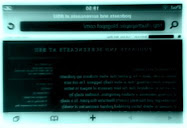Not fair. Someone is trying to steal my title of 'most rubbish name for podcasting web resource'. No matter, they have failed. Podcasting for Pedagogic Purposes (it's bad, but not that bad) is a wiki based, I think, at the University of Chester. It contains various links and materials related to podcasting - including a contribution from our very own Nigel Holt. Thanks to Ian for sending me the link.
Linked from the PPP wiki is Reflections on Educational Podcasting (way down the crap name register, that one): a blog associated with a podcasting project at Sheffield Hallam. There is also notice of a podcasting conference in Oxford on April 3rd.
I did, in fairness, attempt to change the title of this blog, but just couldn't come up with any decent puns (I gave up when the name 'Pod Stewart' raced maniacally through my head). Any suggestions would be welcome...
Wednesday, 18 February 2009
Thursday, 12 February 2009
Blackboard 9
I'm just posting this as an experiment to see whether this blog might be able to do the job of Minerva's Owl. It's just a quick follow up to Ian and Joe's comments on Blackboard 9. I've had a quick look at the promotional screencast and it looks to me like Blackboard have finally entered the 21st century. Up to now their new releases have felt like increasingly convoluted efforts to make an old-fashioned filing system look and feel a bit like a Web 2.0 application. This version certainly looks like a dramatic shift (as you say, Ian, it will mean significant retraining), but I think it's one that we should adopt as quickly as is reasonable.
Wednesday, 11 February 2009
Screencasts and academic writing
Anyone reading this was probably at the VLE meeeting today where Richard Stamp and Roger Heaton demonstrated their work so far on the Beacon projects. I was struck particularly by Roger's writing support screencasts: short films demonstrating correct referencing, compiling bibliographies etc. I think they could work really well across the board, and I wonder whether the University should think about producing some generic screencasts which could simply be copied into individual module sites. These could be supplemented by subject-specific materials, but this approach would at least prevent people reinventing the wheel every time they wanted to show how to create a correct in-text reference using Harvard, for example. The same, I think, could go for demonstrations of how to use library databases - I wonder how many Times Digital Archive films are already in existence - each representing a fair chunk of one staff member's time...?
Subscribe to:
Comments (Atom)
